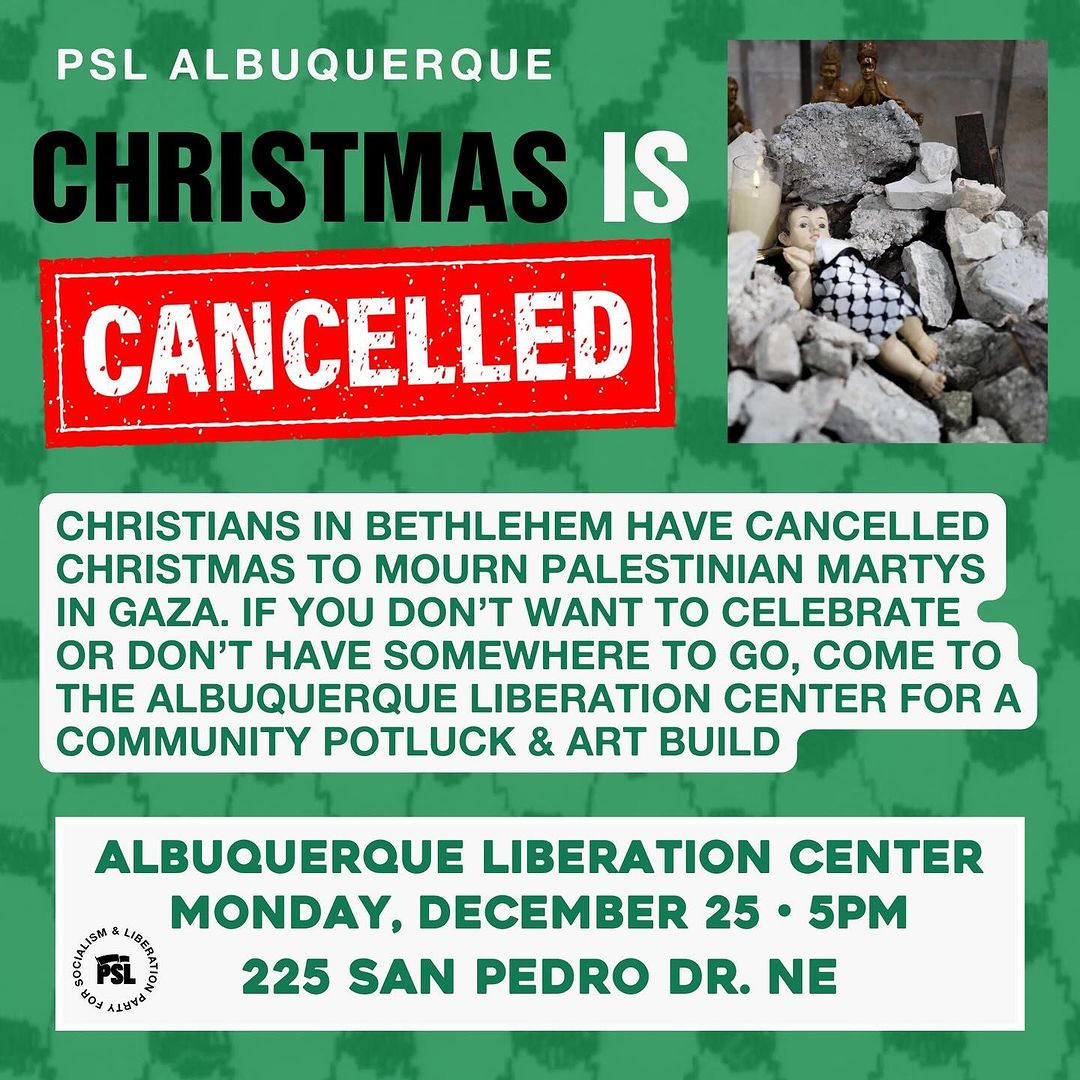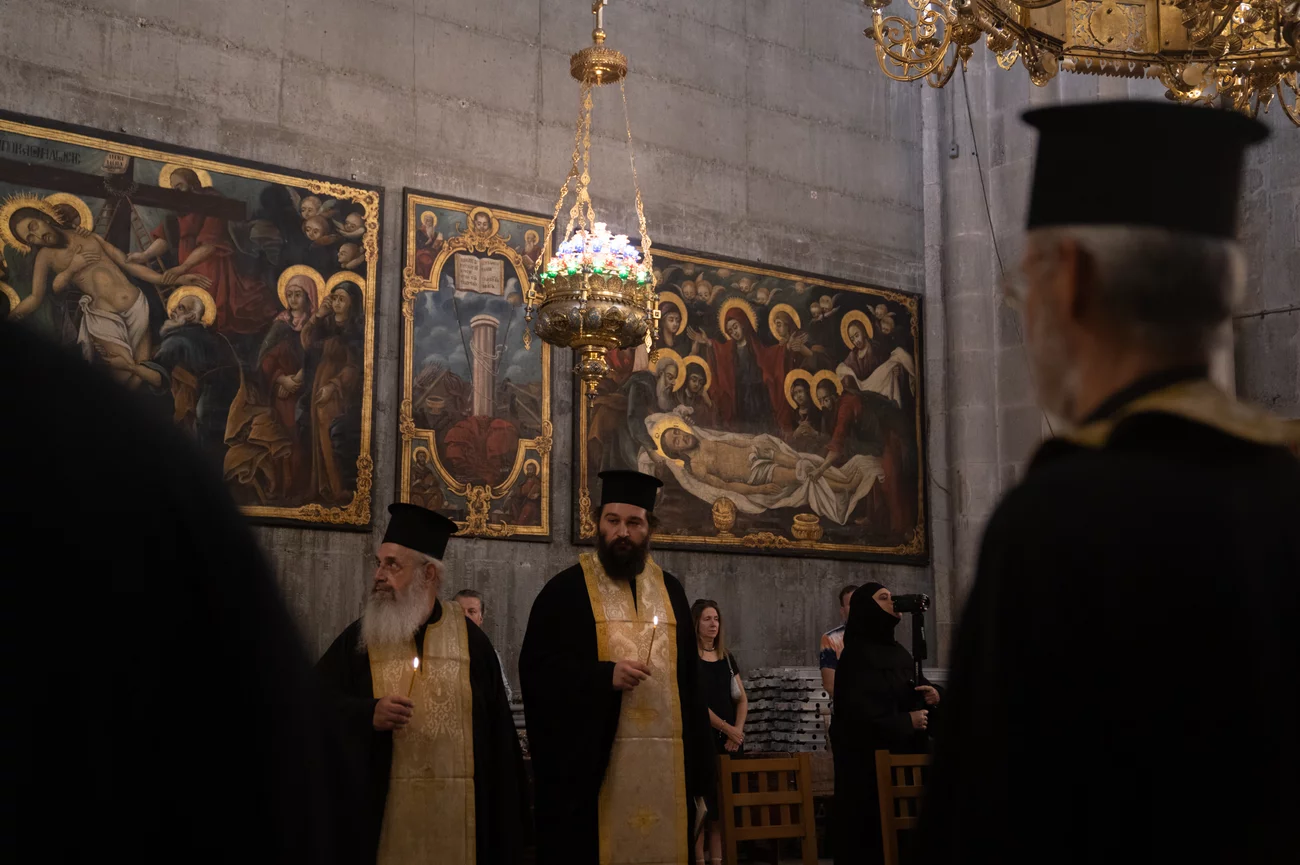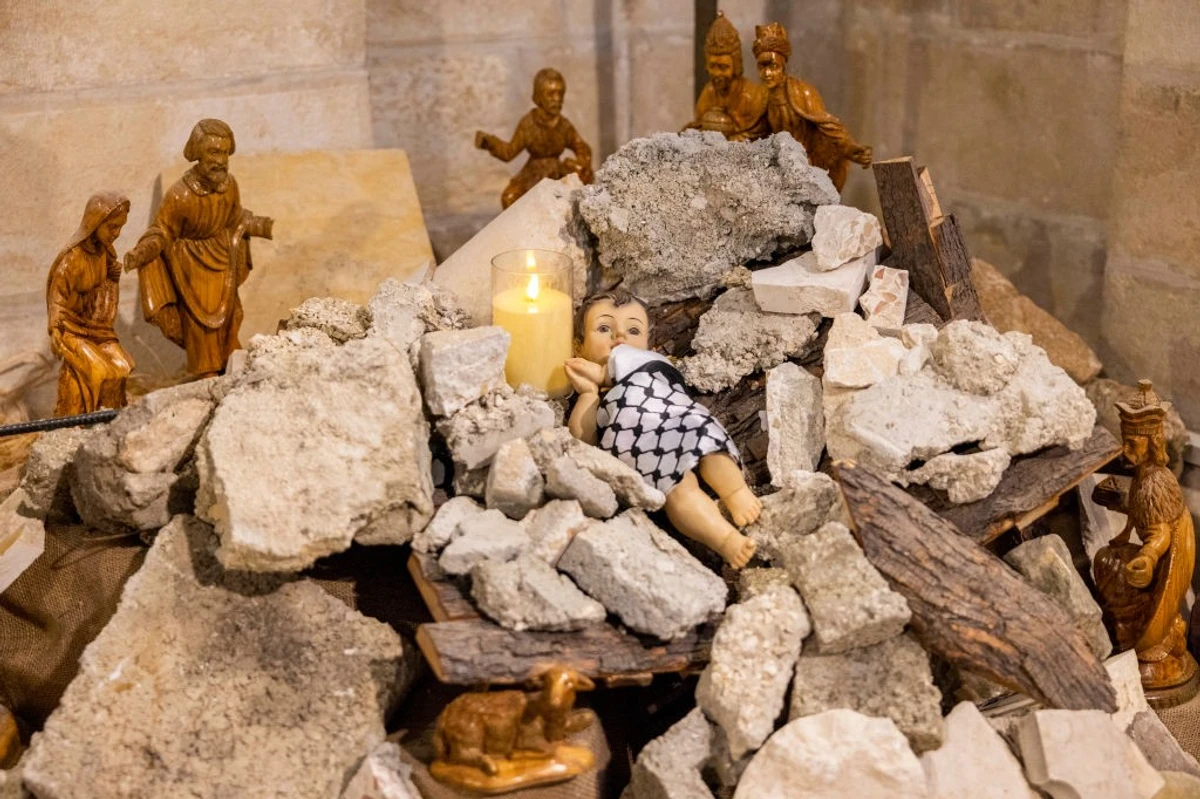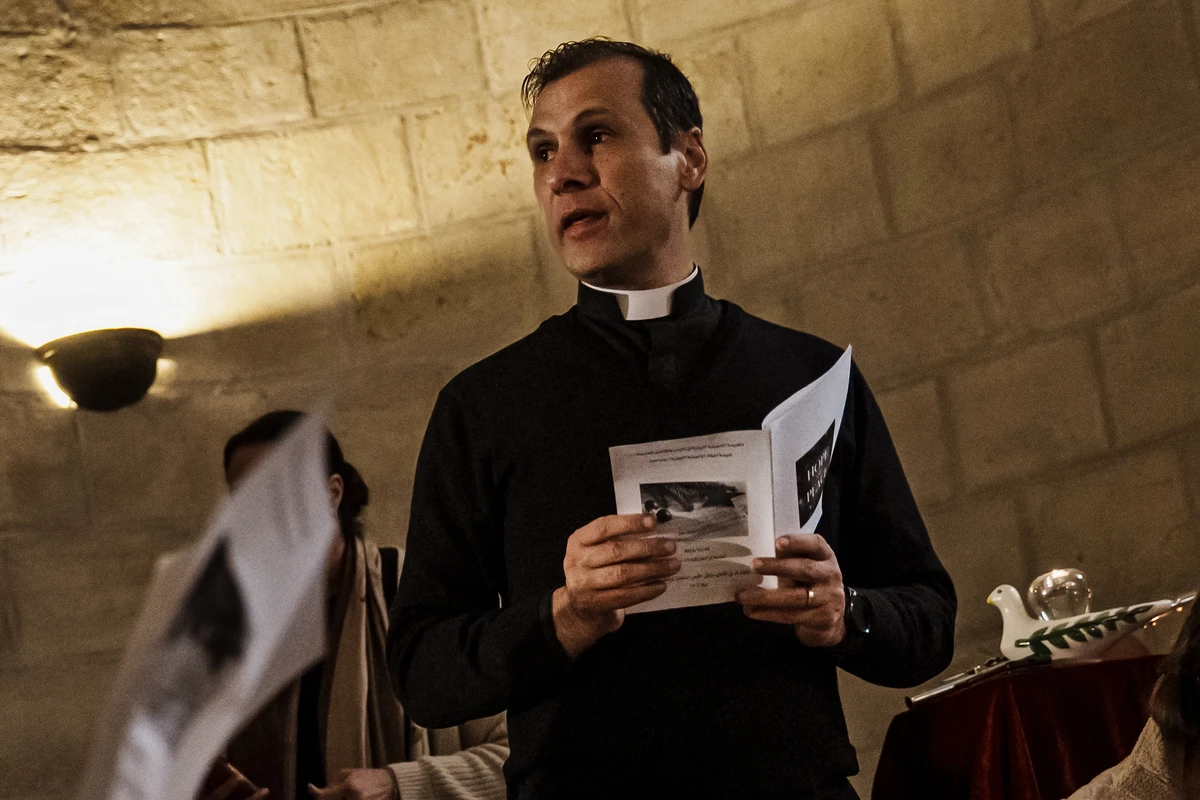Christ is Born in Bethlehem
By John San Nicolas | March 21, 2024
Bio: John San Nicolas is a junior at UNM studying Religious Studies and Philosophy. He focuses on the interaction of Christianity and politics, and here shares insights into how colonialism shapes global Christian theology and how this affects geopolitics. With family originating from Guam and Mexico, John like many others has come to learn the importance of questioning how religion shapes and is shaped by power and politics
As Israel’s injustices against the Palestinian people increase, as entire families are wiped off the face of the earth, and as the world looks on in horror at Israel’s impending invasion on Rafah, a minority of a minority continually takes a stand: Palestinian Christians.

No doubt many of us have heard of the deep faith and work that the Christians of Gaza, the West Bank, and occupied territories have been engaged in for decades. As of recently, they have received much attention. As a matter of fact, I remember the Party for Socialism and Liberation posting about these Christians on Instagram during Christmas time. (This is unusual, because in America, Christians and socialists rarely get along!) During the Christmas season, many churches in Jerusalem, Bethlehem, and Gaza made the decision to forgo the usual holiday celebrations as an act of mourning. This lack of Christmas celebrations in Palestine garnered attention around the world. Some months before then, Palestinian Christians resurfaced in the world’s consciousness when Israel bombed the Church of St. Porphyrius, the third oldest church in the world.
 I do not recall another time when Christian communities have mobilized themselves as a force for good amidst such sheer evil and have also been given such a wide platform to speak their message. Palestinian Christians have been authoring books, going on podcasts, founding universities, and getting involved in their communities for a very long time to forge a better life for Palestinians and to educate others, mostly Westerners, about the Palestinian predicament.
I do not recall another time when Christian communities have mobilized themselves as a force for good amidst such sheer evil and have also been given such a wide platform to speak their message. Palestinian Christians have been authoring books, going on podcasts, founding universities, and getting involved in their communities for a very long time to forge a better life for Palestinians and to educate others, mostly Westerners, about the Palestinian predicament.
As an evangelical scholar, I feel the need to amplify the work and faith of my sisters and brothers in faith. In the Christian Bible, it is written that “if one member suffers, all the members suffer with it” (1 Corinthians 12:26, NKJV). This verse means that the community of Christians, throughout history and throughout the world, is connected.
If one Christian community suffers, all the others feel their pain. Christians usually practice this well, as they care very deeply about members of their faith that suffer persecution. For example, there is the Voice of the Martyrs, founded in 1967. This ministry elevates the experiences of Christians who are marginalized in places like North Korea and Nigeria. Open Doors is another similar organization that fights against persecution and discrimination against Christian communities on the margins.
But sadly, sometimes ideology gets in the way of Christians suffering in solidarity with each other. And this has been starkly true in the case of Palestinian Christians.
Amplifying Palestinian Christians is not meant to take away from the voices of Muslim, Druze, and nonreligious Palestinians—these voices should be elevated as well. Rather, I wish to elevate the Palestinian Christian call for Western Christians to reexamine their religious beliefs. What is happening right now in Palestine is not a religious conflict, but religion globally plays a big part in shaping and justifying Palestinian death, loss, and suffering. And the theology and ideologies of Christians in Western countries has played an active role in the death and losses of the Palestinian people.
When addressing their fellow Christians across the seas, Palestinian Christians address what is known as Christian Zionism. Zionism itself is diverse, but Christian Zionism broadly speaking is the belief that Israel is the people of God, has been given the “Promised Land” by God, and has the right to settle and rule that land—eerily similar to the American notion of Manifest Destiny. (Mitri Raheb in his book Decolonizing Palestine points out that Christian Zionism, as an ideology supporting the return of the Jewish people to Palestine, existed before Jewish Zionism did).
As an evangelical in the US myself, I have encountered Christian Zionism online and in churches my whole life. Being raised in it, I myself had Christian Zionist beliefs at one time until I started learning more about Palestine and the history of the State of Israel.
Most of the time, Christian Zionism is uncritical of Israel. It assumes that being the people of God means that you can do no wrong, or worse, that when you do wrong, you’re not responsible for it. Usually, Christians will cite passages of the Bible that say things like, “I will bless those who bless you [i.e., the people of Israel], and him who dishonors you I will curse, and in you all families of the earth shall be blessed” (Genesis 12:2, ESV).
The idea is that Israel must be supported, and its supporters will be blessed by God Himself for their support. Unfortunately, Christian supporters of Israel do not often pay attention to the end of that verse—whether Israel really is blessing all the families of the earth. It is certainly not blessing Palestinian families.
There are softer versions of Christian Zionism, too. Plenty of American evangelicals disagree with Netanyahu’s policies and how he is conducting war against Hamas—but they never go so far as to critique Israel in a radical sense, to get to the root of things (for that is what “radical” traditionally means). They see in terms of individual bad political actors, not in terms of systemic settlement and colonization.
A prevalent attitude among Christian Zionists is a sort of indebtedness towards the modern State of Israel. Through ancient Israel, God raised up a nation through which the Messiah would be born. (For Christians, this messiah is Jesus. For Jews, there is disagreement on whether a messiah is yet to arrive, or whether the messiah is a metaphorical figure or Israel itself.) Since ancient Israel made the birth of the Christian savior possible, it is believed that Christians have a duty to support Israel today.
I must first say that Christian Zionism is not something that all Christians believe. I have found that many Catholics and Orthodox either don’t care for supporting Israel or are quite critical of it. There are also plenty of Christians outside of Palestine that firmly stand for the Palestinian people. Here I would be remiss to mention that Zionism is not something that all Christians or Jews believe. Judaism is an incredible, richly diverse tradition. We have seen that in many protests around the US, Jewish people have been extremely active in supporting Palestinians and challenging Israel’s Zionist project. This is extremely important to keep in mind, lest supporters of Palestine truly do become antisemitic, as many have.
Now, the underlying theology of Christian Zionism, as we have mentioned, is not monolithic. People often say that Christian Zionism comes from what is called premillennial dispensationalism.
Under this theological view, Christians support Israel so they will be on the right side of history when Jesus comes back. Israel is part of the fulfillment of ancient biblical prophecies. Indeed, the Jews’ return to the Holy Land is seen as a fulfillment of prophecy in itself. Some scholars note that Israel, to these Christians, becomes a location in the world where God is actively and visibly at work in human history. Israel becomes what scholars of religion call a fetish, a “signifier of stability”—these Christians can be affirmed that their faith is true by observing the success and prosperity of Israel as the work of God in real time.
However, not all Christian Zionists believe this. Some are Renewalists, who believe supporting Israel fulfills different kinds of ancient prophecies. Others are theological liberals, who don’t support Israel so much because of prophecies for the future, but more because of the genocidal horrors of the past that the Jewish people suffered under Hitler’s Nazi Germany—and today the Holocaust remains important as ever to remember.
It is challenging talking with other Christians who support Israel. They see it as an obligation, as obedience to God, to support the Zionist project. I fear sometimes that it is no use to tell Zionist Christians that there are Christians being killed by the IDF, or to tell them what Palestinian Christians are saying. Beyond that, Palestinian suffering alone does not seem enough to correct these false and destructive views held by Western Christianity.
This is, to me, one of the greatest betrayals surrounding this genocide. Palestinian Christians are a dwindling minority. They make up around 2% of the population in the Holy Land. They face the same challenges and have lost the same lands as their fellow Palestinians. Yet they are also striving to call time on Christian Zionism. They are working to empower the next generations of Palestinians through organizations like Tent of Nations. They are steadfast in their commitment to nonviolence and in their hopes for reconciliation between Palestinians and Israelis. But their work and words go unheeded.
It must be crushing to not only live through bombings, ethnic cleansing, and settlement, but to know that your coreligionists across the globe believe that your decimation is God’s will, that the children dying under the rubble somehow stood in the way of “God’s people” ruling the land. These excuses for murder are accompanied by the usual talking points: those civilians were “human shields,” it is simply Israel’s self-defense, or that’s just what happens in war.
American Christians must reexamine what it means to be the people of God. Israel being God’s chosen people, as Christians believe, means that they should be held accountable for their genocide of the Palestinian people. After all, that is what the Christian concept of covenant is about. If one enters into a covenant, or agreement, with God and becomes God’s people, there follows a commitment to righteousness and justice. Recall the verse cited above—Israel is supposed to bless the families of the world, not erase them.
And until that change comes, the Christians of Palestine will keep fighting for a just peace. Until that day comes, Palestinians will keep dying. Until that day comes, genocide will continue.
There is an ancient prayer that goes, “how good and pleasant it is for brethren to dwell together in unity!” (Psalm 133:1). Christian Zionism, however, rends a tear in this unity in the global Christian community and continues to rub salt on the wounds that it leaves.

Christ was born in Bethlehem, and Bethlehem was too drained by war and violence to celebrate Christmas this past year.
I’d like to close with an excerpt from Reverend Munther Isaac’s sermon, “Christ in the Rubble.” Isaac is a Palestinian evangelical, who pastors the Lutheran Evangelical Christmas Church in Bethlehem, where Jesus was born under the throes of the Roman empire.
His sermon is an encouragement to his fellow Palestinians, a message of resilience and victory, as well as a deep mourning at being betrayed by his brothers and sisters in faith across the sea.
“We cried out: My God, My God, why have you forsaken Gaza? Why do you hide your face from Gaza? In our pain, anguish, and lament, we have searched for God, and found him under the rubble in Gaza. Jesus became the victim of the very same violence of the Empire. He was tortured. Crucified. He bled out as others watched. He was killed and cried out in pain – My God, where are you? In Gaza today, God is under the rubble.”

